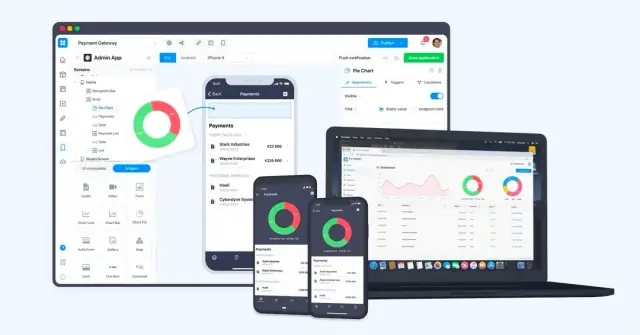The Role of Custom CRM in Multichannel Marketing
Discover the importance of custom CRM systems in creating personalized, effective multichannel marketing campaigns with better insights and improved customer retention.

In today's digital industry, businesses face the challenge of engaging customers through multiple channels, including websites, social media platforms, email campaigns, and mobile applications. To succeed in this highly competitive environment, companies must embrace a strategic approach to customer engagement known as multichannel marketing.
Multichannel marketing allows businesses to connect with their audience across various platforms to tailor messages and create a seamless, consistent experience for the customer. The cornerstone of successful multichannel marketing lies in a company's ability to gather and analyze customer data. Acquiring insights from multiple channels helps businesses understand their customers more intimately, enabling them to predict and respond to their needs effectively.
Enter the custom Customer Relationship Management system (CRM) — a powerful tool that allows businesses to manage customer data, streamline communication, and create personalized marketing campaigns across different channels.
Why Custom CRM Solutions are Key to Multichannel Marketing
Custom CRM solutions enable businesses to stay ahead of the competition in multichannel marketing by offering the following advantages:
Integration with multiple channels
A custom CRM system allows businesses to manage customer information across various marketing channels, creating a unified customer view. This centralization of data ensures marketers can quickly access vital customer insights to inform their strategies.
Data analytics and reporting
Custom CRM systems come with powerful data analytics capabilities that allow businesses to analyze customer behavior in real-time. This information helps marketers fine-tune marketing campaigns to better target specific customer segments, ultimately driving revenue growth.
Automation
Multichannel marketing campaigns can be time-consuming and labor-intensive. Thankfully, custom CRM solutions offer automation features that simplify campaign management and ensure consistent messaging across channels.
Personalization
Personalization is essential for standing out in the crowded market. Custom CRM systems enable businesses to get detailed insights into customer preferences, allowing them to provide personalized solutions tailored to the individual customer's needs.
Customer retention
By leveraging the power of custom CRM solutions, businesses can build stronger relationships with customers and foster loyalty. These systems help companies stay in constant communication with customers through multiple channels, keeping them engaged and driving repeat business.

The Benefits of Custom CRM in Multichannel Marketing
Custom CRM solutions provide businesses with numerous benefits that set them apart in their multichannel marketing efforts. Here are some of the key advantages:
- Improved customer targeting: By analyzing customer data across multiple channels, businesses can identify patterns and trends that help them better target customers. Custom CRM systems can segment customers based on demographics, preferences, purchase history, and more, enabling marketers to design tailored marketing campaigns that resonate with their audience.
- Better understanding of customer behavior: Custom CRM systems offer powerful data analytics capabilities, allowing businesses to gain a deep understanding of customer behavior. They can track customer interactions across various touchpoints, enabling businesses to provide a seamless, consistent experience.
- Higher customer retention: Building strong relationships with customers is the key to driving repeat business. Custom CRM systems give companies the tools they need to streamline customer communication and provide personalized experiences. This fosters lasting customer relationships and ensures they keep coming back to do business.
- Increase sales conversions: As businesses gain a comprehensive understanding of customers through custom CRM solutions, they can create targeted campaigns that play an essential role in driving sales conversions. With the right targeting and messaging, companies can increase the likelihood of converting a potential customer into a paying one.
- Personalization across various marketing channels: Personalization is crucial to standing out in the crowded market. By analyzing customer data across multiple touchpoints, businesses can offer tailored solutions and marketing campaigns that genuinely resonate with their customers across channels.
In summary, custom CRM solutions play a pivotal role in the success of multichannel marketing campaigns. These systems enable businesses to get better insights into their customers' preferences and behaviors, allowing them to create personalized marketing strategies that drive revenue growth and improve customer retention.
Creating a Custom CRM System Using No-Code Platforms
Custom CRM solutions have revolutionized the way businesses approach multichannel marketing, and no-code platforms play a significant role in making their development more accessible and affordable. No-code platforms empower businesses to design, build, and deploy custom CRM systems without writing a single line of code. These platforms provide a visual interface for designing the CRM's components such as data models, user interface, and workflows.
Aside from simplifying the development process, no-code platforms can also accelerate deployment, reduce the need for expert programming skills, and lower the risk of technical debt. Here's a step-by-step guide on creating a custom CRM using a no-code platform:
- Evaluate your business requirements: Begin by identifying the specific goals and objectives you want your custom CRM to achieve. This helps you determine the system's core features and functionalities to better support your multichannel marketing initiatives.
- Select a no-code development platform: Choose a no-code platform that offers the necessary tools, templates, and integrations to build your custom CRM system. Research the platform's capabilities, limitations, and pricing to make an informed decision.
- Design your CRM's data model: Use the no-code platform's visual interface to create a data model representing the customer relationships and interactions that your CRM will track. Design tables, fields, and relationships to store and organize your customer data effectively.
- Create user interfaces: Design user-friendly interfaces to interact with your CRM system. Ensure the main navigation, search capabilities, and reporting options are intuitive and meet the needs of your team members who will be using the CRM daily.
- Develop custom workflows: Establish the essential business processes within your CRM, such as marketing campaigns, lead management, and customer service. Create workflows to streamline these processes, automate manual tasks, and enhance collaboration among team members.
- Integrate with external tools: Implement integrations with your existing marketing, sales, and support tools to centralize your customer data and enable cross-channel communication. This facilitates a more seamless and unified approach to multichannel marketing.
- Test and deploy your custom CRM: After developing your CRM system, conduct thorough testing to ensure it meets your business requirements and performs well across marketing channels. Upon successful testing, deploy your CRM and train your team on its proper use.
How AppMaster Powers Custom CRM Development
AppMaster is a powerful no-code platform that simplifies the process of creating custom CRM systems. With powerful features tailored to support backend, web, and mobile applications, AppMaster enables businesses to visually design their CRM data models, UI components, and business processes. Here's how AppMaster empowers custom CRM development:
- Visual development environment: The platform offers an intuitive drag-and-drop interface for designing your custom CRM applications. It provides an easy-to-use design space where you can create and modify components without writing code.
- Flexible data modeling: With AppMaster, you can visually create database schema, relationships, and fields to store your customer information effectively. The platform supports various data types and ensures seamless data management across all marketing channels.
- Comprehensive business processes: The platform's Business Process Designer allows you to create custom workflows, REST API, and WSS endpoints for your CRM system, streamlining your multichannel marketing operations. Business processes can also be executed on the user's browser for web applications, enabling quick and responsive interactions.
- Scalability and performance: AppMaster generates applications with the Go (golang) programming language for the backend, Vue3 framework and JS/TS for web applications, and Kotlin and Jetpack Compose for Android and SwiftUI for iOS. This provides exceptional scalability and performance for enterprise and high-load use cases.
- Integration capabilities: Connect your custom CRM with other marketing, sales, and support tools to enable cross-channel communication and centralize customer data. AppMaster supports integration with popular platforms and APIs.
- Regular updates and maintenance-free: As a comprehensive integrated development environment (IDE), AppMaster regenerates applications from scratch whenever requirements are modified, ensuring no technical debt and up-to-date systems.

Key Considerations for Implementing a Custom CRM
Before implementing a custom CRM system, it's crucial to evaluate several aspects of your business and tailor the CRM solution to align with your goals. Here are some key considerations to keep in mind:
- Understand your requirements: Assess your business goals, marketing channels, and customer insights to determine the core functionalities and features you need from your custom CRM. This sets the foundation for designing a CRM system that is aligned with your business objectives.
- Define clear goals and objectives: Establish measurable goals and objectives for your CRM implementation, such as improving customer satisfaction, increasing sales conversions, or streamlining marketing efforts. This helps you monitor the success of your custom CRM and adjust your approach as necessary.
- Select the right no-code platform: Choose a no-code platform that caters to your CRM development needs, offers necessary integrations, and provides sufficient customization capabilities. Make sure to consider factors like pricing, support, and ease-of-use before making a decision.
- Data security: Ensure your CRM system adheres to data protection standards and industry regulations, such as GDPR and HIPAA. Implement strong security measures to safeguard sensitive customer data and maintain customer trust.
- Maintainability and scalability: Select a no-code platform that allows for easy updates without introducing technical debt. This ensures your CRM system remains up-to-date and can scale as your business grows.
- Training and user adoption: Encourage user adoption by providing comprehensive training for your team members on how to use the custom CRM effectively. Help your employees understand the benefits and features of your CRM solution to maximize its potential in supporting multichannel marketing.
In conclusion, custom CRM solutions play a crucial role in enhancing your business's multichannel marketing efforts, and no-code platforms like AppMaster make their development more accessible and cost-effective. By creating a custom CRM tailored to your specific business requirements, you can improve customer targeting, better understand customer behavior, and achieve higher customer retention across multiple marketing channels.
Conclusion: Enhancing Multichannel Marketing Outcomes
Custom CRM solutions play an integral role in driving successful multichannel marketing campaigns. A custom CRM enables businesses to gain deeper insights into their customers' preferences and behaviors, thereby shaping marketing strategies for better targeting and personalization. Implementing a custom CRM solution assists in increasing customer retention, improving sales conversions, and achieving higher ROI on marketing investments.
The advent of no-code platforms like AppMaster has made it simpler for businesses to design, develop, and deploy custom CRM systems without expert programming skills. These platforms accelerate the development process, reduce associated costs, and minimize the risk of technical debt. By selecting the right no-code platform and understanding key considerations for implementation, businesses can reap the benefits of a custom CRM tailored to their specific needs.
Investing in a custom CRM for your multichannel marketing efforts can enhance your overall marketing outcomes and help your business grow. Explore the various options and tools available to create a CRM solution that aligns with your organization's goals and requirements, and propel your multichannel marketing initiatives to new heights of success.
FAQ
A custom CRM solution is a customizable customer relationship management system tailored to meet the specific needs and requirements of a business. It allows companies to manage customer interactions, sales, marketing, and service processes more effectively.
Custom CRM solutions provide better integration and analytics capabilities across different marketing channels. This enables businesses to create personalized marketing campaigns, obtain detailed customer insights, and improve customer retention.
Some benefits include improved customer targeting, better understanding of customer behavior, higher customer retention, increased sales conversions, and personalization across various marketing channels.
No-code platforms like AppMaster enable businesses to visually design and develop custom CRM systems without the need for expert programming skills. This accelerates the development process, lowers costs, and reduces the risk of technical debt.
Key considerations include understanding business requirements, defining clear objectives, selecting the right no-code platform, ensuring data security, and maintaining system updatability and scalability.
Yes, custom CRM solutions can cut costs by reducing time spent on manual tasks, improving team productivity, and helping businesses better target customers for increased sales conversions.
A custom CRM helps businesses better understand their customers' preferences, needs, and behaviors. This knowledge enables them to create personalized marketing campaigns, offer tailored products and services, and build lasting customer relationships.
You can get started by signing up for a no-code platform like AppMaster that enables you to design, build, and deploy your custom CRM system without writing code. Explore the platform's features and capabilities to understand how it can cater to your business needs.





